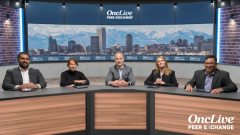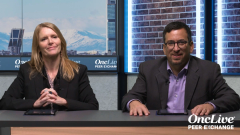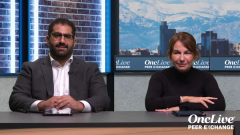
Treatment Options in EGFR-Mutant NSCLC in Second Line and Beyond
Joshua K. Sabari, MD, reviews data from the MARIPOSA-2 trial and discusses treatment options in the second line and beyond for patients with EGFR-mutant non–small cell lung cancer.
Episodes in this series

This is a synopsis of a Peer Exchange video series featuring Benjamin P. Levy, MD, of Sidney Kimmel Comprehensive Cancer Center at Johns Hopkins; Solange Peters, MD, PhD, of University Hospital of Lausanne; Joshua K. Sabari, MD, of NYU Langone’s Perlmutter Cancer Center; Edward B. Garon, MD, MS, of UCLA Jonsson Comprehensive Cancer Center; and Marina Chiara Garassino, MD, of University of Chicago Medicine Comprehensive Cancer Center.
In a discussion between Dr Joshua K. Sabari, Assistant Professor of Medicine at NYU Langone Health, and another speaker, treatment options for non–small cell lung cancer (NSCLC) after disease progression on osimertinib were explored. Dr Sabari first explains that defining disease progression itself is a challenge with patients with NSCLC on osimertinib. Unlike with first- and second-generation epidermal growth factor receptor (EGFR) tyrosine kinase inhibitors (TKIs), where 60% of patients had a T790M mutation, resistance mechanisms after osimertinib are much more heterogeneous, with about 10% to 15% of patients having MET amplification, 10% with C797X alterations, and others with BRAF V600E mutations or transformation to small cell lung cancer.
Given this heterogeneity, Dr Sabari's standard practice is to re-biopsy these patients using liquid or tissue next-generation sequencing to determine the best next therapy, often enrolling them onto clinical trials. He has previously studied the immunotherapy agent anti-EGFR antibody amivantamab as a single agent and combined with the EGFR TKI lazertinib, but response rates did not significantly improve with the combination while toxicity did. This led to the phase 3 MARIPOSA-2 trial adding carboplatin and pemetrexed to amivantamab and lazertinib in this post-osimertinib setting. While this regimen nearly doubled progression-free survival from 4 months with chemotherapy alone to 8 months, Dr Sabari notes it comes with increased toxicity, especially rash and skin effects. He feels these can be managed in academic settings but could be challenging to administer more broadly.
*Video synopsis is AI-generated and reviewed by OncLive editorial staff.







































